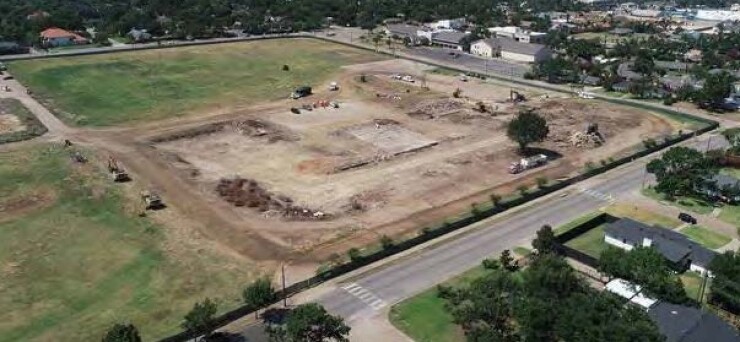The Dallas Independent School District is ready to price $274 million of debt less than three months after winning approval of the largest bond proposal in state history.
The series 2021 general obligation bonds are on the competitive calendar for Jan. 20. RBC Capital Markets and Estrada Hinojosa & Co. are co-financial advisors on the sale.
With the Texas Permanent School Fund guarantee, the bonds carry triple-A ratings from Moody’s Investors Service, S&P Global Ratings and Fitch Ratings. The underlying ratings are Aa1 from Moody’s and AA-plus from S&P and Fitch.

Fitch rates about $2.7 billion of outstanding DISD bonds.
Despite classroom disruptions and enrollment losses resulting from the COVID-19 pandemic, “Fitch believes over the long term, resumption of normal business activity should produce a return to economic, population and tax base gains in line with pre-pandemic trends,” analyst Rebecca Moses wrote in the ratings report.
As of last year, DISD had about $3.13 billion of tax-supported debt outstanding. That represented about 2.4% of the district’s tax base, according to the preliminary official statement.
On Nov. 3, Dallas ISD voters approved $3.5 billion of bonds for school building and technology needs. The approved amount represented the bulk of the $3.7 billion request, despite voters rejecting three out of five bond propositions for athletic facilities.
The bond authorization is expected to fund the capital needs of the district over the next decade without raising the current debt service tax rate.
Dallas ISD has 1.1 million residents with 230 schools that serve most of the city of Dallas and all or portions of 11 area cities and towns. The district's population growth of about 11% since 2010 exceeds the U.S., but lags that of the state. Student enrollment came to 153,861 in fiscal 2020, which was a roughly 1% decline from the previous year.
The district started virtual classes on Sept. 8 with 15,000 students missing from its original projections for the 2020-21 school year.
Although the lost enrollment could be costly, funding was not immediately affected because the Texas Education Agency allowed districts to receive funding based on projections from the previous three years for the first 12 weeks of the 2020-21 school year. The so-called “hold harmless” provision for the COVID-19 pandemic is similar to the state’s enrollment calculations in the wake of Hurricane Harvey on the Texas coastal area.
It remains to be seen if TEA will again hold Texas school districts harmless for enrollment loss in the spring 2021 semester, Fitch noted.
“Nonetheless, Fitch believes management's assumption is feasible given half of the fiscal year will be covered by TEA's prior average daily attendance hold harmless measure, future budgetary savings of 3% anticipated, in addition to some unbudgeted, one-time reimbursement revenue likely to be received,” Moses wrote. “Underpinned by solid expenditure flexibility and strong demonstrated fiscal performance, Fitch expects the district will prudently manage its spending to maintain a financial cushion consistent with Fitch's 'aaa' reserve safety margin.”
Most of Dallas ISD's operating revenue comes from property taxes, which are expected see modest growth.
“Fitch expects future long-term revenue growth prospects will continue at a pace above inflation but below U.S. GDP,” Moses wrote. “The district lacks the ability to independently increase operating revenues.”
For fiscal 2021, the $1.66 billion general fund operating budget included a deficit of 1% of spending or $12 million, based on a similarly sized enrollment loss of 1%.
With the Texas Legislature starting its 87th session Tuesday, 23 education associations sent a letter to state leaders seeking continuation of the “hold harmless” provisions in the second half of the school year.
“The fluctuations in student attendance during this school year due to the pandemic have also largely been outside the control of school leaders,” the letter said. “To financially penalize school districts for attendance declines during this pandemic runs counter to the [TEA] Commissioner’s recognition of the reality of what is happening across the state.”
School districts that benefitted from an expansion of pre-kindergarten school funding in the 2019 legislative session fear that a tighter state budget could threaten that funding.
House Bill 3 passed in 2019, invested $6.5 billion in new school funding. The bill required all districts offer full-day classes for eligible four-year-olds.
“The coronavirus pandemic is materially affecting state revenues and is expected to continue applying downward pressure in the coming months,” Moses said. "While state officials have directed certain state agencies to reduce spending by 5% for the remainder of the 2020-2021 biennium, no reduction in K-12 funding was included in that directive. Changes to K-12 funding for the upcoming 2022-2023 biennium likely will be considered in the next legislative session.”
Despite the year's disruptions, Dallas ISD strengthened its financial position at year end of fiscal 2020, Fitch pointed out.
“This fiscal performance was largely the result of overall stability in budgeted operating revenues, including the approximately $61 million received in federal Coronavirus Aid, Relief and Economic Security (CARES) Act funding that replaced a roughly equal amount of budgeted state aid, in addition to some cost savings from the coronavirus school closures and certain one-time revenue resources,” Moses wrote.
Under Superintendent Michael Hinojosa, Dallas ISD has faced some of its biggest challenges, including a swarm of tornadoes in 2019 that damaged several schools, including one, Thomas Jefferson High School, which was already closed for a bond-financed expansion approved by voters in 2015.
A few months after the tornadoes, the pandemic struck, forcing the district to develop distanced learning on an emergency basis.
In November, the district hired Denver Public Schools Superintendent Susana Cordova as deputy superintendent.
Cordova has more than 30 years of experience in education as a teacher and school leader at elementary, middle and high school levels.
Hinojosa, a Dallas native and graduate of Dallas ISD's Sunset High School, served an initial term as superintendent in Dallas ISD from 2005-2011 and returned as superintendent in 2015.





